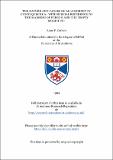The nature and causes of allomorphy in Cuzco Quechua : with special reference to the marking of person and the 'empty morph' ni-
Abstract
It is the purpose of this thesis to examine the reasons why Cuzco Quechua, an Amerindian language of Latin America, uses allomorphs, or multiple forms, to represent the minimal semantic units of the language (or morphemes). Starting from the Initial hypothesis that the relatively minor role of allomorphy in contemporary Cuzco Quechua indicates the earlier absence of that allomorphy, the motivation for the introduction and retention of allomorphy is examined, as this relates to a number of characteristic types; Vowel Deletion, affecting final suffixes, Consonant Cluster Simplification and Vowel Dissimilation, affecting suffixes of the verb stem, and the potential allomorphy of the suffixes of Person, pronominal and verbal. Such allomorphy proves to be the result of attempts to contain new morphological developments within existing structural preferences of syllable configuration, and to limit the potential for semantic ambiguity, arising out of identity of form, or homonymy. The unanticipated result of such a study is the implication in all cases considered of an earlier process of affixation, leading to the formation of untypical morph-forms, Allomorphy is seen to be the by-product of compensatory change, introduced to modify the results of previous developments, In particular, the role of the 'empty morph', ni, of nominal Person is found to be implicated in the derivational history of all Quechua suffixes of Person, and its origin imputed to an early role of the verb ni-, 'to say', used with auxiliary function. Based on the evidence of allomorphy, the conclusion is drawn that many of the suffixes of Cuzco Quechua owe their origin to syntactic forms of expression, indicating that the role of the syntactic construction in this typically agglutinative language was formerly more significant than is now recognised.
Type
Thesis, PhD Doctor of Philosophy
Collections
Items in the St Andrews Research Repository are protected by copyright, with all rights reserved, unless otherwise indicated.

